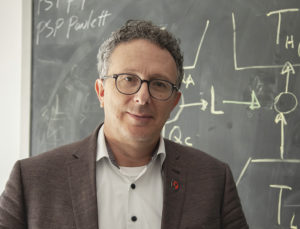The International Space Science Institute ISSI is proud to announce
Prof. Marco Velli
(Space Physics at the Earth, Planetary and Space Sciences Department, University of California, USA) as the Johannes Geiss Fellow 2022.

Marco Velli, Johannes Geiss Fellow 2022
Marco Velli is Professor of Space Physics at the Earth, Planetary and Space Sciences Department, University of California, Los Angeles, USA. A student of the University of Pisa and Scuola Normale Superiore, he has spent research periods at the University of St. Andrews, Scotland, the Observatoire de Paris, France, Università della Calabria, Italy, and the Smithsonian CfA, Cambridge, MA, as well as the Jet Propulsion Laboratory, California Institute of Technology, where he remains a Senior Scientist.
Marco Velli’s research has focused on space plasma physics and solar magnetic activity, with many original results on the stability of magnetic structures anchored in the photosphere, wave propagation and shock formation in inhomogeneous and stratified plasmas, nonlinear evolution of current sheets and magnetic reconnection, the properties of turbulence in dynamically forced, open systems and wave particle interactions in the solar corona and heliosphere.
Prof. Velli carried out a complete analysis of the propagation of Alfven waves in stratified stellar atmospheres, showing how total reflection is never achieved and providing a general discussion of the profile of the transmission into the solar wind. He was also among the first to suggested that wave reflection plays a role in the formation of the turbulence spectrum seen in the solar wind. This work was the basis for the election to AGU fellowship in 2014. Prof. Velli demonstrated the dynamical reason the solar wind is supersonic and showed that generally speaking subsonic flows connecting a star to the interstellar medium survive only over a vanishingly small range of parameters. In other words stars either accrete material or emit supersonic winds connecting with a shock to the interstellar medium. To study solar wind turbulence via numerical simulations, Prof. Velli developed the expanding box model. More recently, together with his students he showed that Sweet Parker current sheets cannot form in space plasmas generally, and that the tearing instability proceeds on ideal time-scales.
Professor Velli played a major role in the development of Parker Solar Probe (PSP), the first spacecraft to fly within 9 solar radii of the Sun’s surface to directly study the outer solar corona and acceleration region of the solar wind, as well as in the Science Definition team for Solar Orbiter. Marco Velli has taught mechanics, electromagnetism, astrophysics, and plasma physics courses at the University of Florence and UCLA. He has been member of peer review committees for NASA research and payload proposals, and member of the Space Science and Exploration working group for the European Space Agency (ESA). He has published over one hundred peer-reviewed research papers involving many international collaborators, as well as invited papers and lecture notes.
At ISSI Marco Velli plans to work on a book on the expansion of the corona into space and formation of the heliosphere in the light of the new data of Parker Solar Probe. He will also participate in relevant ISSI Teams and continue collaborations using Parker and Solar Orbiter data to shed light on the sources and evolution of the solar wind and embedded turbulence.
The Fellowship is named after Prof. Johannes Geiss, the founder of the institute.
ISSI had received excellent proposals from top level scientists from which the selection committee chose the eighth JGF recipient after thorough evaluation. The selection committee consisted of the Directors and the Chair of the ISSI Science Committee.
ISSI is honored by the high interest from the science community in the Johannes Geiss Fellowship and would like to deeply thank all applicants.
